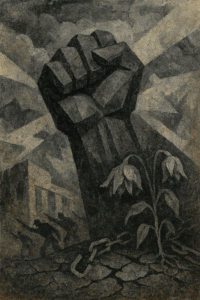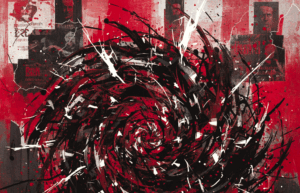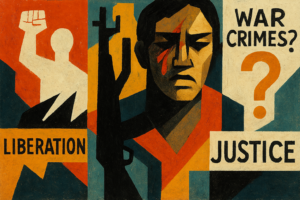
This post has already been read 56 times!
Share the post "Bangladesh’s Quiet Slide Into Autocracy: The End of a Democratic Success Story"
In recent years, Bangladesh has periodically drawn global attention for its ostensibly strong economic growth, its humanitarian efforts in sheltering more than a million refugees from neighboring Myanmar, and its battle against Islamist militant groups connected to transnational terrorist organizations. It has been portrayed as a success story of both liberalization and globalization. The eighth most populous country in the world shook off military rule in the 1990s to become an electoral democracy. It successfully pulled 15 million people out of poverty between 2006 and 2021 and has cut the overall poverty rate in half since 2000. Its manufacturing and textile sectors have flourished. Bangladesh has far surpassed its neighbor India in many key human development indicators, such as female employment and life expectancy. Located on the hinge between South Asia and Southeast Asia, it is also a country of increasing geopolitical significance.
But there are plenty of reasons to be wary of this bullish story. Economists have raised concerns about the actual rate of GDP growth, which may be lower than official figures suggest, and about growing disparities in the country as a result of development policies. Scrutiny of the country’s domestic political environment reveals a gloomier picture still. Bangladesh is creeping toward authoritarianism under Prime Minister Sheikh Hasina, who has ruled for nearly 14 years. In 2021, the V-Dem Institute, a democracy research organization, categorized the country alongside Hungary, India, Turkey, the United States, and others as examples of democracies that were “autocratizing.” Some of the classic markers of authoritarianism are easily discernable in Bangladesh; power is increasingly concentrated in the hands of Hasina, and the legislature is dominated by the ruling party, which has also established a firm grip over the civil administration and law enforcement agencies.
Bangladesh’s democratic backsliding is precipitous. Already, the government wields increasingly unchecked power, the opposition is cowed and fragmented, the judiciary is grossly compromised, and civil society has withered. If the erosion of its democracy is not stopped, Bangladesh will become a de facto one-party authoritarian state. Unfortunately, few forces inside or outside the country seem willing or able to do anything to avert disaster.
A DEMOCRATIC DAWN
After liberating itself from Pakistan in 1971, a coup in 1975 brought the military to power. The generals would effectively rule until 1990, when a popular uprising ousted Hussain Muhammad Ershad, the pro-Western general who had ruled the country since 1982. In the electoral campaign that followed, two parties emerged as the strongest: the centrist Bangladesh Awami League, helmed by Hasina, the daughter of Bangladesh’s first president, and the center-right Bangladesh Nationalist Party under Khaleda Zia, the widow of another former president. When the vote was held, in 1991, the BNP won. Zia presided over a transition from a centralized presidential system to a more accountable parliamentary one.
So began an era of relatively healthy electoral democracy, characterized by regular free elections, few restrictions on freedom of expression and assembly, a vibrant civil society, and an independent judiciary. Some important democratic institutions, however, remained weak, including the Election Commission, the Anticorruption Commission, and the Human Rights Commission. But elections provided a functional system of checks and balances, and popular participation in politics was at an all-time high.
The system was nimble enough to respond to major procedural disputes. In the lead-up to the 1996 parliamentary contest, Awami League partisans warned that an election managed by the BNP would be unfair, stirring protests across the country. The demonstrations worked: the parliament subsequently revised the constitution to institute a caretaker government, consisting of a nonpartisan cabinet headed by the country’s former chief justice, that would take over to oversee elections during the period between the dissolution of a parliament and the creation of a new one. This constitutional provision satisfied the rival parties and delivered two consecutive fair elections, in 1996 and 2001, in which power alternated between the BNP and the Awami League.
But then Bangladeshi democracy began to fray. Relations between the two major parties deteriorated, particularly after an assassination attempt on Hasina in 2004 orchestrated by an Islamist militant group with tacit support from within the BNP government—support that the BNP government made an awful effort to cover up. That year, the BNP also amended the constitution so that it could place a former chief justice sympathetic to the party at the head of the next caretaker government. The move sparked uproar and violence, a harsh government crackdown, and an immense political impasse that led to military rule under the guise of a civilian government between 2007 and 2008. International pressure and domestic unrest forced an election in 2008 that delivered a victory to the Awami League, giving Hasina her second stint in power. Many Bangladeshis hoped that the end of this short period of military rule would rejuvenate the country’s democratic prospects. But the opposite happened.
THE BACKSLIDE
The breakdown of trust between the parties encouraged an authoritarian turn. Emboldened by the wide parliamentary majority it had won, the Awami League scrapped the constitution’s caretaker government provision in 2011. The move was to secure the dominance of the ruling Awami League, whose leaders deeply mistrusted the BNP. This removed a crucial democratic guardrail by allowing the incumbent to supervise—and potentially manipulate—parliamentary elections. Hasina ignored the attempts of the international community, especially the efforts of UN mediators, to encourage her government to reverse course. The opposition, led by the BNP, demanded the restoration of the provision and boycotted the next election, in 2014. As a result, the Awami League has dominated the parliament ever since.
In the following years, the party has presided over the steady erosion of democratic institutions and practices. The judiciary no longer enjoys the independence it once did. A constitutional amendment in 2014 gave parliament the power to impeach judges, making the judiciary more vulnerable to partisan influence.
The space permitted to civil society has narrowed considerably. A 2016 law limits how nongovernmental organizations can raise money from external sources, a measure that has effectively become a weapon to control independent civil society. The country had a long tradition of active civic associations and a busy array of nongovernmental organizations focused on social development that together encouraged citizens to be civically engaged. Nonpartisan professional organizations spearheaded the pro-democracy movement in the 1980s, and organizations, such as citizens’ groups that emerged in 2002 and have pushed for fair and transparent elections, contributed to the robust health of civil society. The country’s once vibrant civil society has become a shell of itself. Now, supporters of the ruling party vilify intellectuals and leaders of these civil society organizations, including by organizing social media mobs to target contrarian voices. In 2018, parliament passed a draconian law that has muzzled the press and broadly restricted freedom of expression. Since its introduction, authorities have filed cases against more than 2,500 people alleging they have caused the deterioration of law and order, hurt the image of the state, or defamed on the Internet the leaders of the ruling party. The government has engaged in indiscriminate wiretapping beyond its legal jurisdiction without justification, leading to suspicions of mass surveillance.
A culture of fear has permeated society. Authorities have severely restricted the fundamental right to assembly enshrined in the constitution by denying the opposition the permits to hold public meetings and by engaging in repeated attacks on protesters when they do gather. Leaders and activists of the opposition parties, especially of the BNP, face frivolous charges intended to prevent them from challenging the government. But such measures don’t just target partisan political activists; police and armed supporters of the ruling party have attacked students who were merely demanding better road safety. Worse, the government has engaged in extrajudicial killings and enforced disappearances of individuals from various strata of society, including former diplomats, academics, and opposition activists.
Slowly but surely, the Awami League has entrenched its power. Ahead of the 2018 parliamentary election, its control over the civil administration was so absolute that there seemed to be little separation between the party, the government, and the institutions of the state. A newly formed opposition alliance stood no chance in the face of a pliant Election Commission, wanton violence by pro-government groups, and the partisan role of law enforcement agencies who filed numerous baseless charges against opposition activists and allowed supporters of the Awami League to attack opposition activists. The ruling party and its allies won 288 of the 300 seats in the parliament. Media reports suggested the widespread practice of ballot stuffing and result manipulation (in certain cases, it seems even dead people were recorded as having voted) helped produce such a lopsided victory. The 2018 election shattered popular confidence in the electoral system, as reflected in the very low turnout in all the local and by-elections that have taken place since then.
The ruling party’s actions accelerated the downward spiral, but the opposition has done little to arrest it. In 2015, the BNP launched violent protests that cost the party dearly by providing the government with the pretext for heavy-handed repression. That agitation also ended up isolating the party. Zia, a former prime minister and the leader of the BNP, was convicted on dubious graft charges in 2018 and sentenced to 17 years in jail. The BNP insists that the charges were politically motivated, intended only to bar her from politics and weaken her party. After she served over two years in jail, her conviction was temporarily suspended in 2021 due to her ill health. Zia’s condition has deteriorated, and her doctors fear for her life unless she receives treatment abroad, but the government has not allowed her to leave. Internal schisms have also weakened the BNP. Zia’s heir apparent, Tarique Rahman, helps lead the party from exile in London. Not only has he been convicted of corruption, but he has also been sentenced to life in prison for his role in the 2004 attack on Hasina. It seems unlikely that the party will be able to revitalize itself any time soon so that it can mount a real challenge to the Awami League.
INTERESTS OVER VALUES
Despite all these worrying developments, Bangladesh is rarely mentioned in discussions of democratic backsliding around the world. Western countries, including the United States, have prioritized a policy of engagement in large part to maintain strong security ties to ward off potential terrorist threats in South Asia. They have largely placated the Hasina regime rather than encouraging it to change course.
This policy is broadly continuing, but to its credit the Biden administration has started to make some adjustments. In its dealings with Bangladesh, it has reaffirmed democracy and human rights as pillars of its foreign policy. Washington sent a pointed message to Dhaka by excluding Bangladesh from the White House’s summit of democracies held last December and imposing sanctions that same month on the Rapid Action Battalion, a special police unit, and seven sitting and former officials accused of human rights violations.
But for the most part, the Hasina government faces little external pressure. India, whose own democracy has deteriorated under Prime Minister Narendra Modi, has extended unqualified support to the Hasina government since 2009 due to New Delhi’s strategic and economic interests, which include access to Bangladeshi ports and transit through the country to India’s northeastern region. Bangladesh has become increasingly important to China, whose aggressive efforts to extend its sphere of influence in South Asia include funding several large infrastructure projects in the country. The Awami League has quite astutely leveraged these geopolitical realities to cement its domestic position.
Larger security concerns have also allowed the international community to overlook the condition of democracy in Bangladesh. Transnational terrorist groups, such as al Qaeda in the Indian Subcontinent and the so-called Islamic State, also known as ISIS, have become more established in the country since 2013. An attack by terrorists on a café in the capital, Dhaka, in 2016 drew worldwide attention. Western countries have since prioritized security cooperation over trying to stem the erosion of Bangladeshi democracy.
They have also sought to support Bangladesh as it deals with the pressures of sheltering more than a million Rohingya refugees from neighboring Myanmar. International organizations and Western governments have failed to compel Myanmar to allow these refugees to return and have offered the Rohingya few options beyond the purgatory of the camps in the east of Bangladesh. The Rohingya refugee crisis became an important justification for Western governments to skirt their responsibilities in seeking to support democracy; they have washed their hands of the Rohingya and left them for Bangladesh to deal with, and so they do not wish to further annoy the Bangladeshi government by trying to encourage domestic political reform.
But perhaps the biggest impediment to international pressure on Hasina’s government is economic; business interests have trumped concerns over democracy. Bangladesh’s strong growth in the past decades has made the country a new destination for international private investment. Foreign governments appreciate the stability offered by Hasina’s rule. As Bangladesh upgrades its military, France, Turkey, and the United States have vied over arms contracts with the government, further strengthening Hasina.
Bangladesh’s next election is scheduled to be held in late 2023, but it promises to deliver more of the same. The experience of the two previous parliamentary polls coupled with ongoing political developments suggest that a fair and inclusive election is unlikely. Without reform of the current system in which the incumbent oversees the election, the ruling party will almost certainly triumph again. The Hasina government is already setting the stage by suppressing its critics; cracking down on cyberspace, including social media; and further weakening the opposition parties by leveling new cases against grassroots activists and by prohibiting public gatherings. A new Election Commission appointed in February will remain loyal to the incumbent.
Unfortunately for Bangladesh, it seems unlikely that the opposition can force real change and that the ruling party will weaken itself in the name of strengthening democratic institutions and norms. The country’s democratic decay will not slow unless the international community plays a proactive role, making it clear to Hasina’s government that authorities must reopen democratic space in the country, scrap draconian laws, hold law enforcement agencies accountable, and once again allow citizens to participate in politics. Without these changes, Bangladeshis will have little reason to trust the result of next year’s election, and the country will keep sliding into autocracy.
Originally Published in Foreign Affairs. April 2022.
Bangladesh’s Quiet Slide Into Autocracy | Foreign Affairs
Share the post "Bangladesh’s Quiet Slide Into Autocracy: The End of a Democratic Success Story"
This post has already been read 56 times!





